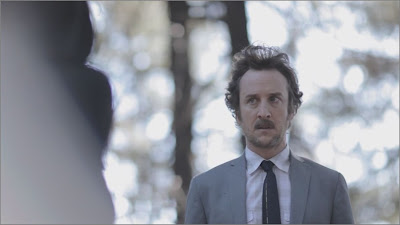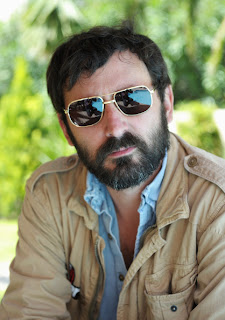GETTING IT WRONG AND CLOSER TO RIGHT
Writer-director-cinematographer-musician Quentin Dupieux
(did he also make lunch for the crew?) began his last film, Rubber, the uber-self-conscious tale of
a suddenly animate car tire that goes on a psychokinetic killing spree throughout
the desert of the American Southwest, with what amounted to his movie’s entire raison d’être, his cinematic mission
statement. The lead character directly
addresses the audience with a declaration that many of the events and
circumstances in some of the most popular narrative movies of all time—E.T.- the Extra-terrestrial and Love Story are name-checked, among
others—occur for no reason whatsoever.
(The italics are mine, but, hoo, boy, are they ever the director’s as well.)
The movie is a none-too-deep-dish rumination on narrative logic and the role of the audience in accepting, rejecting, and sometimes even abetting the most illogical of narrative leaps, a jokey, nihilistically self-satisfied lark, albeit one with a healthy dollop of visual flair, whose rib-nudging is insistent and incessant enough to cause bruising for those who resist, as well as bouts of self-congratulation among the cognoscenti who dig nothing more than a good flaunting of cinematic convention, who get what Dupieux is up to. I got it, all right, and I came away wishing Roger Corman had directed it instead. If you haven’t guessed by now, I pretty much hated Rubber for its smug attitude toward not only its own shallow purpose, but also for its sour contempt for its own audience.
So I had slim hope that Dupieux’s new movie, Wrong, would be anything more palatable to my obviously hemmed-in, bourgeois sensibility. Dolph Springer (Jack Plotnick), a nonplussed suburbanite whose life, to Dupieux’s delight, is apparently composed of one off-kilter, dreamlike non sequitur after another, dutifully rousts himself from sleep each morning-- to an alarm clock that reads 7:60 rather than 8:00-- and plods off to a job at a nondescript travel agency-- where it is constantly raining inside the office-- from which he has already been fired three months before the movie begins. On the morning that begins Wrong, he discovers that his beloved dog, Paul, has gone missing, an event that sends Dolph into an existential tizzy and sparks the movie’s spin cycle of deadpan surrealist comedy. (It’s one of Dupieux’s better minor key jokes that his protagonist has a name which sounds much more like a dog’s than the one belonging to the missing mutt.)
The movie is a none-too-deep-dish rumination on narrative logic and the role of the audience in accepting, rejecting, and sometimes even abetting the most illogical of narrative leaps, a jokey, nihilistically self-satisfied lark, albeit one with a healthy dollop of visual flair, whose rib-nudging is insistent and incessant enough to cause bruising for those who resist, as well as bouts of self-congratulation among the cognoscenti who dig nothing more than a good flaunting of cinematic convention, who get what Dupieux is up to. I got it, all right, and I came away wishing Roger Corman had directed it instead. If you haven’t guessed by now, I pretty much hated Rubber for its smug attitude toward not only its own shallow purpose, but also for its sour contempt for its own audience.
So I had slim hope that Dupieux’s new movie, Wrong, would be anything more palatable to my obviously hemmed-in, bourgeois sensibility. Dolph Springer (Jack Plotnick), a nonplussed suburbanite whose life, to Dupieux’s delight, is apparently composed of one off-kilter, dreamlike non sequitur after another, dutifully rousts himself from sleep each morning-- to an alarm clock that reads 7:60 rather than 8:00-- and plods off to a job at a nondescript travel agency-- where it is constantly raining inside the office-- from which he has already been fired three months before the movie begins. On the morning that begins Wrong, he discovers that his beloved dog, Paul, has gone missing, an event that sends Dolph into an existential tizzy and sparks the movie’s spin cycle of deadpan surrealist comedy. (It’s one of Dupieux’s better minor key jokes that his protagonist has a name which sounds much more like a dog’s than the one belonging to the missing mutt.)
But before he can get to that monsoon-besieged workplace, he
runs into his neighbor (and best friend?), who panics at the prospect of having
to admit that he was seen jogging, and who is leaving the neighborhood on some
sort of vision quest. Then Dolph becomes so transfixed by a menu flyer for the
Jesus Organic Pizza delivery service he finds in the mail that he calls the
number not to order a pie, but instead to engage the sweet-sounding waitress on
the other end of the line about his confusion over the meaning of the company’s
logo, a rabbit riding a chopper. This is an encounter that will cause the movie’s
wacky narrative to further splinter off into even wackier, unanticipated avenues of absurdity.
It’s also essentially the same mission statement that launches Rubber, but restated succinctly in terms
of an event within the movie, rather than a pretentious, deliberately jarring
assault on the Fourth Wall. When Dolph repeatedly questions the logic of that
cycle-riding bunny logo, the waitress doesn’t blow him off—like she would in real life, wink, wink—but instead takes
his concerns seriously, unruffled by the unusual urgency of her customer. With
this one scene Dupieux demonstrates an understanding of how irrational imagery and happenstance can coexist with and even enhance the basic structure of a narrative instead of
simply, and precociously, aiming to blow it up for the sake of the explosion.
This apparent dawning marks a significant advance from the
smart-ass disregard of Rubber and put
me in a much more receptive frame of mind for the rest of Dupieux’s antics, which
includes some chronological misbehavior on his part and much more deadpan
acceptance of the very, very strange—a guy who walks around repainting people’s
cars without their permission, to cite just one example-- as well repeated
encounters with a mysterious guru of canine behavior, Mr. Chang (William
Fichtner, brilliantly wielding a vaguely Indian but ultimately indefinable
accent), who benignly orchestrated Paul’s disappearance before losing, and
perhaps killing the dog himself. There's also a lumpy private dick hired by Mr. Chang to
find Paul who operates out of the back of a discount pharmacy and has lots of
technology devoted to documenting the emotional journey of dog feces. (If, at
this point, you even have to ask, Wrong
may not be your cup of Bunuel-infused, Lynch-laden joe.)
But it’s not just Dupieux’s anchoring of his mind-altering
silliness to something of a narrative spine that makes Wrong so much more right than his previous picture. His own sense
of visual wit seems much more firmly established here—he’s clearly got a sense
of how images and sequences should be put together, the mastery of which is of
primary importance before one goes about exploding one’s own mise-en-scène, to say nothing of a
hundred or so years of narrative tradition. Wrong
is gorgeously assembled, and even if it doesn’t ultimately add up to much
it’s enlivening to see the director not only playing with form but actually
showing some as well.
He’s on much more solid ground with the performances here too.
The actors in Rubber were treated
with almost as much disregard as the audience (and the audience’s on-screen
stand-ins, who were mocked for wanting to see a killer tire movie and then
killed for it), little more than pawns in their director’s puny vision. And
yes, the monotonal deadpan that marks the peripheral reaction of Wrong’s incidental players wears thin
quickly, as this sort of stylish approach usually does for me. (In the
mainstream, see the films of John Landis.) However, Wrong is buoyed precisely the degree of humanity, of interest in
warmth and personality and cockeyed rejection of the dutifully bleak that is displayed
by his actors-- Fichtner, to be sure, who delights in his character’s
enlightened mania—he openly rejects Volume 1 of his seminal self-help book My Life, My Dog, My Strength in favor of
the more fully realized Volume 2-- but also Alexis Dziena as Emma, the
starry-eyed pizza waitress who falls in love with Dolph on the phone and can’t
tell the difference when he is replaced by a gardener who resembles Dolph not a
whit.
But most especially good is Jack Plotnick, whose off-kilter
visage carries the movie, and the audience, giving us something to grab hold
of, a mixture of acceptance and perpetual confusion over the dizzying circumstances
of his daily life in search of Paul which plays deeply well and sympathetically
off of the blinkered, unruffled deadness of the rest of the world. Plotnick, a familiar
face from TV commercials and movies, as well as a stint on Reno 9-1-1, registers an amazing level of empathy for someone who
initially seems so sociopathically detached from reality— he somehow manages to
leaven both Dolph’s needs and his obvious depression with genuine concern for
the character, never encouraging the audience to respond to his situation with
cruel or callous laughter. And it helps that Plotnick has a natural
handsomeness that seems slightly exaggerated for artistic effect, as if his
features had been randomly stretched and rearranged by a prankish portrait
painter—he seems of this world, yet also clearly and primarily of Dupieux’s,
and he sports a spectacularly receding hairline, highlighted by a perpetually
disheveled pompadour that makes him look as though he’s always just crawled out
from beneath the covers, where he’d seen something really bad. It’s a do that would have made Jack Nance squirm with
envy.
In a recent interview, Dupieux, riffing on that same mission
statement that seemed so blunt and tired in Rubber
and then refined to better effect in Wrong,
made a case for his particular brand of purposeful nonsense:
Almost every movie makes too much sense. That’s why we call them movies — they’re very different from life. And usually in a movie, at the end, you feel satisfied because everything is in order, and everything makes sense… But from my point of view real life doesn’t make sense. Every day you experience stuff that is not necessarily perfectly scripted… When you dream your unconscious makes connections with things that are not supposed to be connected. I really do think it’s the same in real life, I think life would be super-boring if everything was scripted.
In Rubber
Quentin Dupieux displayed a punk provocateur’s delight in reveling in how
little sense anything makes, especially when it comes to the tastes and
expectations of audiences, and it left a lingering odor not unlike burnt rubber
from tires pointlessly spinning, a bird flipped in the general direction of
Hollywood. The final image of that movie indicates that Dupieux, like his fellow,
significantly less talented comrade-in-arms Harmony Korine, would ultimately like
to assault the system from within. Wrong
finds him having gained a bit of perspective as to how his penchant for surreal
imagery can be married with narrative intent without having to introduce the
bitter tang of deliberate alienation, but it remains to be seen if he can make
good on the promise resurrected here from the ashes of Rubber’s burning trash heap. Life would indeed be super-boring if everything
was scripted, but a world where nothing makes sense creates its own brand of
tedium. In such a scenario, if everything, including the director’s own M.O., is
absurd, then eventually nothing is—the smart-aleck snake begins to eat its own
tail. If Rubber suggested that the
snake would soon consume itself, then Wrong
at least offers some amusement and good will in the moment, along with the encouraging
possibility that perhaps there will be other items on the obviously voracious Dupieux’s
menu soon.
****************************************
(Wrong plays in
Los Angeles at the Cinefamily through April 4, and tickets for all performances
are available here, including for tonight 6:00 performance, which will be
introduced by director Quentin Dupieux.)
****************************************
























No comments:
Post a Comment